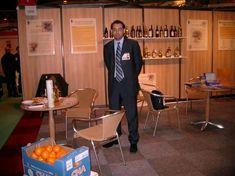
Debuting at the Food and Drink Expo was the Tunisian Centre for the Promotion of Exports (CEPEX). The export promotion organisation is operated by the Ministry of Commerce and helps Tunisian producers to increase their export potential and take advantage of international opportunities.
"Tunisia produces citrus fruit, vegetables, canned fruit and dates along with better known agricultural products," explains Nader Labidi, CEPEX spokesman from the agrofood division. "We are testing how appealing our produce is to Expo visitors, as well as prospecting ourselves. If all goes well here, we plan to come back to the expo with Tunisian food service companies."
Labidi was assessing local interest from wholesalers, restaurants and agents and exposed show visitors to the taste of Tunisia. "We already do business with some European countries and Japan. We view the UK to be an important export market - currently we are sending our dates and wine here but we hope to expand the range by introducing oranges and other produce".
Some 75 per cent of Tunisian fresh produce exports go to Western Europe - potatoes are exported to Germany, oranges and salads to France and Italy, and Saharan-grown tomatoes and cherries to Belgium.
"Other exhibitors have shown good interest in the oranges, simply because they walked by the stand and tasted them. I have had some talks with people interested to explore trade opportunities. In 2006, we also plan to bring Tunisian orange juice to promote here," said Labidi.
Recent studies on the development of the food sector identified the fruit and vegetable processing industry (freeze-drying and dehydration of fruits and vegetables) as an important investment opportunity. Organic fresh produce has been grown in Tunisia since 1996 and it was the second African country to receive organic produce certification. Labidi sees potential export growth for the sector.
With government assistance, many Tunisian food industry companies are restructuring to meet ISO9000 and HACCP standards in order to improve product marketability. "The UK has high quality standards that must be met," said Labidi. "The British market is not an easy market to penetrate - it will take perseverance and a lot of professionalism to win the confidence of the big distributors. But it's a market with strong potential of development for Tunisia."



